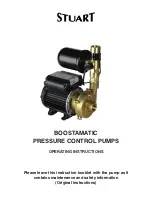
ENGLISH
15
All technical data are marked on the technical label on the pump.
The various items are explained below (Fig. 4):
Fig.4 Data plate
Pos.
Description
1
Description
2
Revision
3
Year
4
Week
5
Serial number
6
Maximum liquid temperature
7
Use
8
Flow rate
9
Maximum head
10
Minimum head
11
Insulation class
12
Degree of protection
13
Submersibility
14
Rated voltage
15
Ampere
16
P1
17
P2 HP
18
P2 kW
19
Frequency
20
Condenser capacity
21
Voltage
22
Rated number of revolutions
23
Logos
24
Pump code
2
INSTALLATION
Before starting up the pump, check that:
The voltage and frequency on the pump’s technical data plate correspond to the values of the power supply system.
The pump's power cable or the pump is not damaged.
The electrical connection must be made in a dry place, far from any possible flooding.
The electrical system is provided with a residual-
current circuit breaker with I ∆n ≤ 30 mA and that the earth system is efficient.
Any extension cables comply with the regulations in force.
2.1
Mechanical Installation
Install the pump in a location that is not exposed to freezing.
When the pump remains inactive at a temperature lower than 0°C, it is necessary to ensure that there is no water residue which
could freeze and damage it.
Hang the pump by passing the rope through the hole provided (see figure 5). Do not hang the pump by the handle.
Do not install check valves near the pump delivery (distance less than 1 metre (3.28ft)). The pump already has a built-in check
valve on delivery.
The DTRON3 pumps already contain a small expansion tank, calibrated for water hammer and small leaks.
In order to reduce the number of pump starts, an auxiliary tank (Figure 6, A) with a capacity of 2 litres can be installed.
If you want to install an additional non return valve (Figure 6, B), it is recommended to position it downstream from the auxiliary tank.
Do not subject the motor to excessive starts per hour. It is strictly recommended not to exceed 60 starts per hour.
































